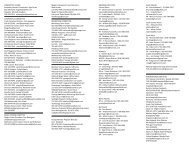(Hank) Moorehouse 1934 – 2011 - The Society of American Magicians
(Hank) Moorehouse 1934 – 2011 - The Society of American Magicians
(Hank) Moorehouse 1934 – 2011 - The Society of American Magicians
Create successful ePaper yourself
Turn your PDF publications into a flip-book with our unique Google optimized e-Paper software.
46 M-U-M Magazine<br />
over<br />
How<br />
Do I HanDle<br />
Hecklers?<br />
“You can’t please all <strong>of</strong> the people all <strong>of</strong> the time, and last night<br />
all those people were at my show.” <strong>–</strong> Mitch Hedberg<br />
Being young makes you more susceptible to hecklers.<br />
Obnoxious people are less intimidated by a young magician<br />
because they can’t separate your skill level from your age.<br />
“She’s young and she’s doing magic; she can’t be very<br />
good.”<br />
But when a magician asks me how I handle hecklers, my<br />
first reaction is to tell that magician that it’s not the right<br />
question. Even as a young magician, if people are interrupting<br />
the flow <strong>of</strong> your show on a regular basis, it is likely due to<br />
something you are doing. Let’s see if we can pinpoint some<br />
“don’ts” to help eliminate those pesky hecklers.<br />
Don’t be rude to your audience or perform tricks where<br />
you challenge spectators. Comments like “You’re not paying<br />
attention,” or “Wrong, the ball is under this cup,” or “See if you<br />
can catch me on this one,” are lines I hope will die out with the<br />
old magicians who use them.<br />
Don’t perform in situations where your audience doesn’t<br />
want to see you. If someone asks to see an effect over dinner<br />
but it’s clear that everyone else at the table couldn’t care less,<br />
then save the trick for another time.<br />
Don’t encourage negative feedback. Hecklers feed on<br />
the attention you give them, so don’t give them any.<br />
wHere Is tHe lIne?<br />
We’ve talked about how important it is for your magic to<br />
reflect your life. And it’s critical that you be yourself onstage.<br />
It’s a natural outgrowth, then, to push the boundaries<br />
<strong>of</strong> what you can get away with. And since dating is on<br />
your mind and the f-bomb is on the tip <strong>of</strong> your tongue, it’s<br />
tempting to do <strong>of</strong>f-color magic. Resist this temptation.<br />
I remember seeing the Amazing Johnathan slay an<br />
audience with dirty magic; every time he said a four-letter<br />
word, the crowd cheered. Johnathan is a comedic genius,<br />
to be sure, but I had to realize that I wasn’t the Amazing<br />
Johnathan, and I don’t perform in a Las Vegas Lounge.<br />
Suggestive material is <strong>of</strong>fensive when it comes from<br />
a younger performer. Some people like crude humor,<br />
but nobody wants to hear it from a minor. Here’s the rule:<br />
if the trick would get you into trouble at the dinner table,<br />
by Joshua Jay<br />
don’t do it!<br />
I even discovered certain words that affected the impact<br />
<strong>of</strong> my magic. Particularly with kids, there are certain words<br />
that suggest a harsh or negative emotion; they aren’t “bad”<br />
words but they sound bad. Even if you’re describing a prop<br />
or action, you should substitute “stupid,” “dumb,” and “ugly”<br />
for words like “silly” or “crazy.”<br />
I’m not suggesting you don’t tell dirty jokes or use fourletter<br />
words <strong>–</strong> it wasn’t so long ago that I was fifteen years<br />
old. But I am suggesting you reserve that material for the<br />
locker room, and keep it clean onstage.<br />
egos?<br />
Magic is about managing egos <strong>–</strong> yours, your audience’s<br />
<strong>–</strong> and how both your ego and your audience’s egos are<br />
affected by your magic. I’m not speaking exclusively about<br />
your getting a big head (though let’s not go that route). I’m<br />
talking about the larger problem that results from being<br />
young and good, which is this: people will project a big ego<br />
onto you.<br />
Whether from a group <strong>of</strong> jealous friends or older<br />
magicians, the very sight <strong>of</strong> you doing magic (and doing it<br />
artfully) at a young age is threatening to sensitive egos. And<br />
since magic requires more than a little self-confidence in<br />
both the way you present your effects and yourself, this is<br />
easily misinterpreted as cocky.<br />
What can we do to curb this bitter jealousy? Not much.<br />
<strong>The</strong> only ego you have control over is your own. So, be extra<br />
polite during your shows, don’t show <strong>of</strong>f, and stay far away<br />
from material that challenges the audience.<br />
You’ll still hear things and get the occasional hostile<br />
comment, but here’s a secret you can take comfort in: all<br />
that jealousy is about how good you are. It’s a compliment in<br />
disguise! Just don’t let that go to your head.<br />
David oliver on<br />
watching Magic shows<br />
Never sit in an audience shuffling, or practicing with a<br />
deck <strong>of</strong> cards (or any other prop). And don’t whisper during<br />
the show to explain your thoughts on methods, routining,<br />
etc. Talk after the show or at home where there’s no chance <strong>of</strong><br />
non-magicians hearing you and learning any magic secrets.<br />
Also, don’t forget to act just like every other audience<br />
member. Don’t take notes during a performance and definitely<br />
applaud, laugh, and smile. Never try to force the<br />
magician to pick you as a volunteer over a non-magician



